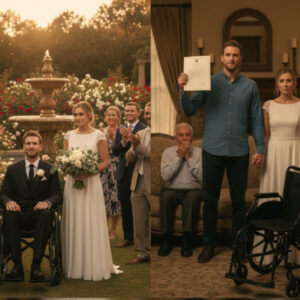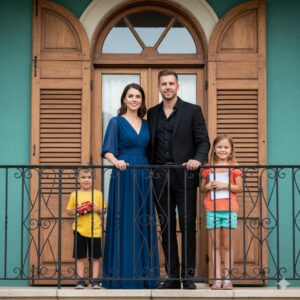Part 2: The Words That Shattered Me
My eldest daughter’s lips trembled as she tried to continue.
— “Dad… Mom is gone.”
I blinked, confused. Gone? The word echoed in my head.
— “What do you mean, gone?” I asked, my voice harsher than I intended.
Her eyes filled with tears, but she didn’t look away.
— “She’s gone to the hospital… and she never came back. She worked herself sick, carrying this family alone after you left. She held on as long as she could… but she’s gone, Dad. Forever.”
The room spun around me. My knees weakened, and I fell onto the chair beside them. The walls I had built inside me — my pride, my stubbornness, my obsession with having a son — all collapsed in an instant.
I looked at my daughters. Their faces were thinner, their clothes worn. They had grown up without me. Without my protection. And now… without their mother.
My youngest, no older than six, crept closer and whispered:
— “We waited for you, Daddy. Every night, we hoped you would come back. But Mom said… even if you didn’t, we still had each other.”
Tears I had held back for years broke free. For the first time in my life, I cried not from anger, but from shame.
I thought leaving would give me the sons I craved. Instead, it cost me everything that truly mattered.
And then, my eldest daughter — the same girl who had once given me that piercing look years ago — said words that cut deeper than any blade:
— “You left us because we weren’t boys. But Dad… we still needed a father.”
The silence after her words was deafening.
And in that moment, I realized: I had destroyed my own family, not because fate gave me daughters — but because I had failed to be the man they needed.
Part 3: The Long Road Back
After that night, I couldn’t sleep. My wife was gone forever, and I had missed every chance to hold her hand, to say “thank you” or “forgive me.” But in front of me were my daughters — the only family I had left.
I told myself: “This time, I will stay. This time, I will be the father they deserve.”
The next morning, I prepared breakfast for them. Burnt bread, salty eggs — the food was almost inedible. My youngest pushed the plate away and whispered:
— “Mom’s food never tasted like this.”
My chest tightened, but I forced a smile:
— “I’ll get better. Just give me time.”
But time was not what they were ready to give.
The Rejection
When I walked my daughters to school, other parents whispered. Some pointed, reminding everyone how I had abandoned my family. My eldest held her sisters’ hands tightly and walked three steps ahead of me, as if she didn’t want to be seen with me.
That evening, when I tried to help with homework, she shut her books and said coldly:
— “We don’t need your help. We’ve been fine without you all these years.”
Her words hit me harder than any punishment life had ever given me. I wanted to explain, to beg for forgiveness, but I realized: they had no reason to trust me.
The Struggle
Days turned into weeks. I forced myself to wake up early, to cook, to clean, to walk them to school. At night, I worked at a factory to earn enough money for their needs.
Sometimes, I found drawings hidden in their notebooks: pictures of a mother with three daughters — and a blank space where a father should have been. That blank space was me.
One night, I overheard my middle daughter praying softly:
— “God, please don’t let Dad leave us again. Even if he doesn’t love us, please let him stay.”
Tears blurred my eyes. They didn’t want riches, or gifts, or promises. They wanted something so simple, yet something I had failed to give: my presence.
The First Crack in the Wall
Months later, after countless attempts, a small moment came. My youngest scraped her knee while playing. She cried and instinctively ran toward me. I lifted her gently, cleaned the wound, and held her until she stopped crying.
When I looked up, I saw my eldest watching from the doorway. For the first time, her gaze softened — not forgiving, not forgetting, but no longer filled with pure anger.
It was just a second, but I knew: the wall between us had its first crack.
The Journey Ahead
I realized earning back their trust wouldn’t take days or months. It might take years. Maybe even a lifetime. But I was ready.
I whispered to myself every night before sleep:
— “You lost your wife because of your pride. Don’t lose your daughters because of your weakness.”
And though the road was long, I carried the hope that one day, my daughters would look at me — not as the man who left them, but as the father who finally came home.
Part 4: The Moment of Forgiveness
Years passed. I still lived with my children, quietly working, saving every penny to take care of their future. The emotional wounds were still there: suspicious eyes, distance during meals, curt answers. But gradually, the coldness lessened. Instead, there was a gentler silence, as if my children were learning to accept my presence in their lives.
Then the day came — the day my eldest daughter graduated from university. I sat in the last row of the hall, wearing an old shirt, my calloused hands clasped together. I didn’t dare sit close, afraid of the gossiping eyes of others, afraid that my child would feel ashamed if I stood next to her.
But when her name was called, when she stepped up to the podium to receive her honorary degree, I couldn’t help but stand up, clapping until my palms were red. Tears fell from my eyes, a mixture of pride and pain.
And then, what I didn’t expect happened. My daughter stopped in the middle of the stage, her eyes darting down the audience. She looked straight at me. For a split second, I saw that look — no longer angry, no longer distant, but as if asking: “Dad, do you see? This is your daughter.”
I nodded, tears streaming down my face.
After the ceremony, I quietly prepared to leave, when suddenly I heard a voice calling from behind:
— “Dad, wait for me.”
I turned around. It was my eldest daughter, in her graduation gown. She came up to me and hugged me in front of her friends and teachers. I was stunned, my hands trembling as I placed them on her back. And then, I heard the words I had been waiting for all these years:
— “I’m so angry with you. But today, I want you to know… I still need you. We all need you.”
Her two younger siblings also came up and put their arms around me. The three of them hugged me tightly, as if afraid that I would disappear again.
In that moment, I knew: all the years of perseverance, all the nights of tears, all the humiliation… finally had meaning. I was no longer the man cursed for abandoning my children, but was called by the simplest, most sacred name: Father.
From that day on, the wall between me and my children gradually collapsed. The wound had not yet healed, but they had opened their hearts. And I swore to myself: “No matter how many more years, I will live only to be worthy of this forgiveness.”
News
Marrying a rich disabled husband to pay off debt to “save” her father, she was looked down upon by her husband’s family for 7 years. One day, he stood up and walked. His first words left the whole family speechless./hi
Marrying a rich disabled husband to pay off her father’s debt, she was despised by her husband’s family for 7 years, until one day he stood up and walked, his first words left the whole family speechless Seven years ago,…
Every week my mother-in-law comes to my house 3 to 4 times, every time she cleans out the refrigerator, gathering all the food for her sister-in-law. Too dissatisfied, I quietly put something in the refrigerator that makes her tremble with fear./hi
Every week, my mother-in-law would come to my house three or four times, and every time she would clean out the refrigerator and take all the food for her sister-in-law. I was so dissatisfied that I quietly put something in…
A Punch. A Pause. And Then? They Realized the New Girl Wasn’t Who They Thought./hi
Bullies Punched a New Black Girl in The Face — Big Mistake… They Had No Clue Who She Really Was The Morning It All Began It was supposed to be just another Tuesday at Westbridge High, a suburban school known for…
One unplanned visit to his maid’s house — one door opened — and a truth powerful enough to shatter his beliefs forever./hi
Without warning, the millionaire decided to visit his maid’s house. He never imagined that by opening that door he would discover a secret capable of changing his life forever. One Thursday morning, with the golden sunlight filtering through the leaves…
My husband said he was on a business trip for 3 days, but the location showed he was at the maternity hospital. I didn’t make a fuss — just quietly did 3 things, causing his life to fall into the abyss of humiliation./hi
My husband said he was going on a business trip for 3 days, but the location showed he was at the maternity hospital. I didn’t make a fuss — just quietly did 3 things, causing his life to fall into…
To legitimize the pregnancy, I agreed to marry a worker. But when my daughter turned three, I was stunned to find something in my husband’s wallet – and then, I understood why he had agreed to marry me all those years ago./hi
To legitimize the pregnancy, I agreed to marry a factory worker. But when my daughter turned three, I was stunned to find something in my husband’s wallet – and then, I understood why he had agreed to marry me. My…
End of content
No more pages to load











